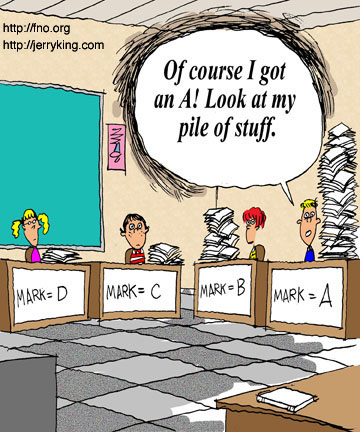For thirty years schools have been racing down a road that was paved with good intentions but full of sound and fury signifying very little in the way of student learning.
Technology is a false god, unlikely to do much for children unless schools focus on learning and make huge investments in professional development. Without dedication to effective teaching practices such as writing as process, new technologies are unlikely to produce better writers. The evidence from 30 years of NAEP writing tests shows stagnation rather than growth.
When technology becomes the goal
When technology becomes the goal, schools fall prey to the false notion that tools and machines promote learning just by their purchase, that networks engender collaboration simply by installation, and students become worldly wise by virtue of exposure to robust information sources.
 The focus on technology in the early years was all too often accompanied by a neglect of sound teaching. In the 1980s we were told computers would teach students to read and do math better. Drill and kill software was all the rage. Decades later there is little mention of these learning tools. The focus on technology in the early years was all too often accompanied by a neglect of sound teaching. In the 1980s we were told computers would teach students to read and do math better. Drill and kill software was all the rage. Decades later there is little mention of these learning tools.
National technology standards from groups like ISTE have kept the myth alive. Many school districts adopt plans that quote from these standards in ways that keep them racing down the same mistaken pathways, buying, buying and installing. The word "digital" becomes a silly preoccupation, as if digital Macbeth were somehow better than print Macbeth. Schools flood classrooms with iPads even though revision of writing is hindered by touch screen technologies.
One can use mind-mapping software without thinking. The focus on software can divert both teachers and students from actual mind-mapping, going through the motions without much thought at all.
 One can compose and complete writing using word processing software without understanding or taking advantage of flexible, fluid electronic text. Perfect for revision, word processing can also support idea processing when combined with mind-mapping software, but it is hard to find schools that do this. One can compose and complete writing using word processing software without understanding or taking advantage of flexible, fluid electronic text. Perfect for revision, word processing can also support idea processing when combined with mind-mapping software, but it is hard to find schools that do this.
While "racing to the top" Congress eliminated funding for the National Writing Project which had shown teachers how to promote effective writing with or without new technologies, but it is this approach combined with idea and word processing that could lead to a surge in student writing capacity. Revision with attention to the Six Traits of Effective Writing could improve the quality of tone, style, word choice and logic.
Technologies are merely tools. A hammer, a pencil and an iPad are not good in themselves. The question is one of purpose and skill. Bad teachers of writing will teach badly with pencil or laptop. Bad lecturers will lecture badly with or without PowerPoint.
Merely filling a school with laptops or iPads does not prepare students for this century. These tools do not work miracles by themselves. They do not convert mediocre essays into strong ones. Despite the pumped up claims, new technologies only improve learning when a school makes professional development a priority. We need more than professional training in software. Teachers must have a chance to see how these technologies can support different kinds of thinking, creation and expression. Pedagogy and strategy are paramount, the technologies secondary. |


 The focus on technology in the early years was all too often accompanied by a neglect of sound teaching. In the 1980s we were told computers would teach students to read and do math better. Drill and kill software was all the rage. Decades later there is little mention of these learning tools.
The focus on technology in the early years was all too often accompanied by a neglect of sound teaching. In the 1980s we were told computers would teach students to read and do math better. Drill and kill software was all the rage. Decades later there is little mention of these learning tools.  One can compose and complete writing using word processing software without understanding or taking advantage of flexible, fluid electronic text. Perfect for revision, word processing can also support idea processing when combined with mind-mapping software, but it is hard to find schools that do this.
One can compose and complete writing using word processing software without understanding or taking advantage of flexible, fluid electronic text. Perfect for revision, word processing can also support idea processing when combined with mind-mapping software, but it is hard to find schools that do this.